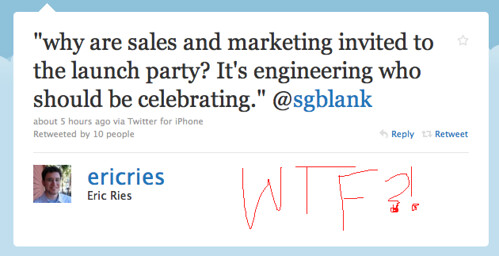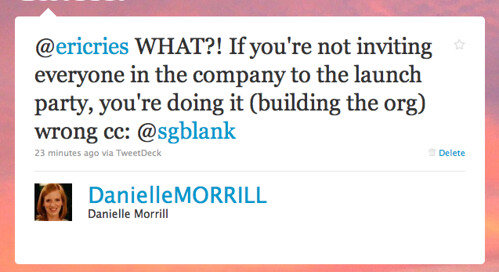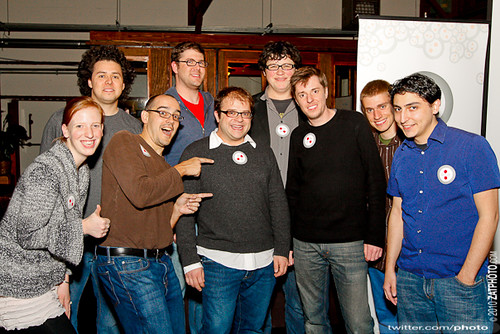-
I’m a Teens in Tech Incubator Mentor
 As announced yesterday in Mashable, the Teens in Tech Incubator program will take place over the course of eight and a half weeks during the summer of 2011.
As announced yesterday in Mashable, the Teens in Tech Incubator program will take place over the course of eight and a half weeks during the summer of 2011.Teens ages 13 to 19 are encouraged to participate in what I think of as summer camp for learning entrepreneurship and building products. Â You must be local to the San Francisco Bay Area to apply (for now) and teams must have at least one developer who can code the project at hand. Â Finding kids to participate in the program might sound daunting, but Teens in Tech has existed for 3 years now and has the ability to draw young entrepreneurs.
The application deadline for the program is March 18th, so if you know a young aspiring entrepreneur make sure to pass it on so they can register in time. Â The program runs June 20th through August 10th, and culminates with a demo day.
-
Quora Questions/Answers Ratio is the New Following/Followers Ratio?
 Remember when Twitter was taking off, and there was a lot of debate about the importance of following back some % of your followers… and not following disproportionately more or less than were following you? It was an interesting way of gauging influence, or desperation for followers in a lot of cases. It also became a useful way for identifying spammers.
Remember when Twitter was taking off, and there was a lot of debate about the importance of following back some % of your followers… and not following disproportionately more or less than were following you? It was an interesting way of gauging influence, or desperation for followers in a lot of cases. It also became a useful way for identifying spammers.Are Quora Answers the New Twitter Followers?
With Quora taking off (yes I’m addict), I’ve been getting a huge influx of followers and I’ve been trying to figure out how to follow people back. On each peson’s profile you get a little bit of data about how they’re using Quora – including three things that are really useful:
- # of Answers
- # of Mentions
- # of Questions
I listed those in the order of which are most important to me. Â The way I think about it, answering a question is the most time consuming thing you can do on Quora and suggests real engagement. Â Mentions aren’t much work on the part of the user, but are harder to come by (mostly famous people seem to have these right now). Number of questions is least important to me, afterall it is easy to ask a question. Â You also don’t get much “credit” for asking good questions in Quora (yet).
I wonder how long until Klout is using this metric to help evaluate how influential various people are in social media.
Oh and btw, check out my ANSWERS on Quora, some of them could easily be a blog post.
-
Goodbye Lazy December, Hello Busy January
Now that the holidays are over, I’ve got a whole lot going on at work. Â Today our newest developer evangelist @rahims started, so now we’re up to 6 on my team and I’ve still got open headcount for another developer evangelist and a marketing manager. Â If you or someone you know would be a good fit, please apply!

I spent the past two weeks up in the Pacific Northwest at my parent’s house in Kingston most of the time, and in Woodinville to see my inlaws as well. Â We spent most of the time getting my parents up to speed on their new Mac products (Dad got an iPad and iPod, Mom got an iMac) as well as watching FOX News, fitting puzzles, reading, and eating at the local bar. Â It was a very relaxing vacation, I got through hundreds of emails and worked quite a bit.
In other happy family news, my brother and sister-in-law few to Ethiopia on New Year’s Eve to finally get their adopted baby girl Isabella.
Upcoming Goodness
Seattle 1/6 – 1/9
Thursday night I fly up to Seattle to spend Friday meeting with folks I’ve been missing, Saturday is the board meeting with Startup Weekend, and Sunday is brunch at my favorite spot Lola with the wonderful Jennifer Cabala before heading home.
Speaking to Code for America Fellows 1/10
I’ll be sharing my experiences with building community among developers for the Twilio cloud communications platform. Â The mission of Code for America (from their website):
Code for America helps city governments become more transparent, connected and efficient by connecting the talents of cutting-edge web developers with people who deliver city services and want to embrace the transformative power of the web to achieve more impact with less money.
500Startups + Startup2Startup Holiday Party 1/13
Yep, gonna be fun to see everyone again.
Hosting Lean Startup Machine @ Twilio HQ 1/14 – 1/16
That’s right, the Lean Startup Machine is taking place at Twilio, so we’ll be around all weekend hanging out and learning about how to apply the lean startup methodology to building a business. Â If you’ve attended Startup Weekend you might recognize the format. Â Pitches on Friday, along with networking and speakers. Â After that, a weekend of working on you MVP (minimum viable product) followed by presentations and judging on Sunday afternoon. Â It’s a fun time, and we’d love to see you there.
1/19 – USV Portfolio Companies Holiday Party @ Twilio HQ
Should be fun, we’re hosting.
Wordcamp PHX 2011 – Phoenix, AZ 1/28 – 1/30
I’ll be speaking at Wordcamp Phoenix about engagement in online communities.
A few more pictures from my parent’s house – the sky there is beautiful in the winter with the low angle sunlight. Â I still can’t believe I took these with my iPhone.


While we were in Woodinville to visit my inlaws, we drove by our house. Our tenants must be loving it, because they did an incredible job decorating it for Christmas.

-
TextWeight Launches to Help Track Weight Loss via SMS
 I’m excited for my hubby, tonight his app TextWeight… which he just launched this morning, is on the front page of TechCrunch.
I’m excited for my hubby, tonight his app TextWeight… which he just launched this morning, is on the front page of TechCrunch.It’s a really simple app. Â You sign up with your phone number, and each morning you get a text asking you your weight that day. Â For me, I already weight myself once each day when I get up in the morning so this makes a lot of sense.
The cool thing is that this is a pull instead of a push. Â I don’t have to remember to text the app my weight, because it askes me. Â Then it graphs how I’m doing over time.
Congrats Kevin! Â You can follow @TextWeight on Twitter.
Cin
-
A Very Merry Weekend
I need to get back to personal blogging, it’s really nice to read back on.
I’m excited for this weekend. Â I’ve been sick for the past week (since last Friday) and it’s time for something a little more cheery. Â Here’s the rundown of what I’ve got planned:
- brunch at my favorite secret French spot
- a nice sweaty workout both mornings
- cookie decorating and setting up the Christmas tree at the loft
- a couple holiday parties
- Tronathon LAN party with the Expensify crew
- mani/pedi with my sister
- Christmas shopping (hopefully online)
So, yay. Â I’ll probably snap some pictures.
-
Speaking About Money & Technology at TEDWomen Parisoma
 Tomorrow (December 8th) I’ll be speaking at Parisoma Innovation Loft following the live broadcast of day two of the TED Women event. Â When I was invited to speak, I was honored. Â TED is about “ideas worth spreading” and not a platform for talking about my startup, which suits me just fine since I’ve been wanting to branch out and talk about some things I’m passionate about aside from Twilio.
Tomorrow (December 8th) I’ll be speaking at Parisoma Innovation Loft following the live broadcast of day two of the TED Women event. Â When I was invited to speak, I was honored. Â TED is about “ideas worth spreading” and not a platform for talking about my startup, which suits me just fine since I’ve been wanting to branch out and talk about some things I’m passionate about aside from Twilio.My Topic: The Power of Money & Technology to Make Us More Connected
I’m fascinated by the fact that we trade with money, and a couple years ago I learned that the earliest writings ever found were of an accounting ledger. Â Money and standard currency are something we take for granted, but even in the United States our currency has gone through several major transitions since the country was founded.
-
Congratulations TechCrunch
 Congratulations to TechCrunch, who announced yesterday at TechCrunch Disrupt that they have been acquired by AOL.
Congratulations to TechCrunch, who announced yesterday at TechCrunch Disrupt that they have been acquired by AOL.I’ve been reading TechCrunch since before I knew I was going to do startups. Â It all started because my friend Blake Scholl was doing a startup, and I set up Google Reader to track TechCrunch so I would be sure to see when his company got coverage. Â At the time I was working for a Fortune 1000 shipping company as a business analyst, and had nothing to do with startups. Â I got addicted to reading the damn thing in the spring of 2007.
TechCrunch is the reason I found out about Twitter, Twitter is the reason I came to understand social media, and there were a few hundred steps more before I landed here in San Francisco to work on Twilio.
If you write in a paper journal, you might have noticed how the daily ritual becomes like a benchmark in your life. Â In a way, it gives you deja vu — but in another way it helps you mark the passing of time. Â Reading TechCrunch is like that for me.
I’m happy to for Michael Arrington and the whole team there, and I hope they get some much needed rest and a chance to celebrate this weekend with their friends and family after TechCrunch disrupt wraps up.
-
Experimenting with Google Scribe
How would you like to have a program that helps you write blog posts faster? Â With Google Scribe I can do just that. Â In this post, I will use the suggestions from Google Scribe to generate some content about social media.Social media is finally about the media in the U.S. and Canada only and are not endorsed by or affiliated with Google in any way that suggests that they endorse you or your use of the Site and the related services or any portion thereof at any time and without notice to you and your family to enjoy a good meal and a drink for the first time in the future and the future of the world and the. Â Recent reports about the growth of Twitter usage suggests that the two are not the only one who can not afford to pay for the cost of the project is to develop a new generation of protein database search programs and the latest news.
Just like that, I’m writing semi-cogent sentences that are really just keyword spam. Â If you’ve ever seen those types of strange SEO juiced blog posts you know what I mean. Â Let’s try another angle. Â I’m going to type 3 words, and accept the fourth that Google Scribe suggests. Â No matter how bad it is, I’ll try to keep the sentences going.Social media is finally becoming a mainstream technology and this is the result of substantial increases in evangelism for the services like Twitter or AIM which are popular with people around the world.
Okay, that wasn’t so bad. Â Google Scribe event suggested “world” as the last word of the sentence before I typed it… and I was able to achieve the goal of the sentence (though the “or AIM” suggestion after Twitter was funny). Â Let’s try the next sentence.Recent reports about the growth of Twitter has (why has, this isn’t proper English given the preceding text) have been used to suggest that social media is a mainstream tool for the businesses that want to build their brands.
Meh, I got mostly “and” “or” “the” other useless suggestions. Â Not sure why… or how I’d benefit from those suggestions. Â It is fast when I am typing and Google Scribe suggests a word that I am not sure how to spell, like ridiculous which I see mispelled all the time. -
Startup Marketing: 2nd Class Citizen, 2nd Rate Results
Wait… what?
This quote from Steve Blank (which I realize is taken out of context, but such is the nature of Twitter, I’m not sure where he was speaking today) definitely rubs the marketer in me the wrong way. Â Why would you ever want to exclude marketing and sales folks at your startup from the launch party (or any of your employees for that matter), as if they had no part in it?

Treat Marketing as a 2nd Class Citizen, Get 2nd Rate Marketers
My first reaction was to feel at bit nauseous about all the startup founders and employees who are influenced by Eric Ries and his popular Lean Startup methodology for product and market development, and probably read this tweet. Â I feel like supporting this attitude encourages one of the most painful, costly, and damaging mistakes that was made at my last startup — and after thinking about it for a couple hours, I can’t not say something.
This isn’t ultimately about Steve’s quote, or Eric’s support of it, which I see as symptoms of the problem. It’s something I’ve wanted to write about for a long time because I experienced it firsthand in my previous startup and it was very damaging to the product, culture, and IMO ultimately the company.
This mentality of “developers before everyone else” is poisonous in startups, and it’s on the road to dangerous levels of hubris, and “pivoting”, or changing the direction of the business multiple times, due to a disconnected view of the world fueled by a Field of Dreams mentality (“if we build it they will come”).

Here’s why…
- Sales and marketing are helpful to have before launch, to make plans for achieving goals
- The greatest insult to a great product, and the people who created it, is to market it poorly
- To grow the business, cofounders need to trust marketing and sales to focus on things that the technical co-founders can’t or shouldn’t have to deal with on a daily basis
- To make great early marketing and sales hires it had better be “our startup” together, in spirit not just in equity stake.
- It’s not about the launch party, its about launching
Order of Operations
When a startup is founded, ideally the entire team is technical. Â There is probably someone who is the most business-minded, but not a dedicated sales or marketing person. Â If there is a non-technical member of the founding team, they’re probably (hopefully!) very deeply engaged in the product development aspect of the startup, and have earned the trust and respect of the engineer(s) co-founders.
Depending on the product and other market conditions, it is possible that the founding team of engineers will launch without anyone in sales or marketing at all, and their developer design and active use of social media will help them spread the word. Â This is exactly what happened with Twilio, which was launched in November 2008 without anyone whose entire job was to take the product to market.
If the product offering is compelling enough, or the cofounders are particularly interesting to the community, getting a TechCrunch story will require little more than a thoughtful email to the writers and a slide deck on Slideshare. Â This is the best case scenario, and in my opinion indicates a very well-rounded founding team with strong awareness of their market (business savvy) — even if their primary focus is building technology. Â However, after that initial burst of attention and activity there are many questions to be answered that have a more to do with building a business than building a product — like how to continue to gain and retain customers. Â This is where sales and marketing are helpful to have before launch, to make plans for achieving these goals.
Getting Past Day Zero
The launch of a new product is just the beginning of what will hopefully be a lasting and happy relationship with customers, press, analysts, and the marketplace in general. Â It is a moment of inflection and incredible stress for the entire organization, whether it is three people, thirty people, or three thousand plus. Â It is gloriously terrifying, and its something teams bond over.
- There is no question that the vision and actual act of creating of the product is what makes it all possible, and that the people who build things that have never existed before are some of the most amazing human beings on Earth. The greatest insult to a great product, and the people who created it, is to market it poorly. This is the core of how I approach marketing. Â Every day that I am spreading the word about Twilio, getting more people to signup, use, and pay for our product I’m honoring the ingenuity that created it, as well as the combination of intellect and execution that continues to make it better.
A Matter of Trust and Focus
When I interviewed I remember the exact moment I was sitting with Evan Cooke, CTO and one of three cofounders, and he offered me the opportunity to work at Twilio as their first hire. Â I looked him in the eye and told him, “I can do this job, but we have to agree that marketing will never become a second class citizen to software development”. Â I was actually afraid, for a moment, that I wouldn’t get the job but I told my husband later that I’d rather know right then what kind of company it was going to be than be miserable for the next year figuring it out. Â That was 18 months ago, and I’ve never ever felt for a moment that there was a disconnect between the engineering team and the marketing team, which now includes a customer service manager and two developer evangelists, in addition to myself.
One of the hardest lesson I’ve learned in business is that despite all my energy and intelligence, I can’t do everything by myself. Â Talented people making tough judgement calls aren’t fungible, and in general human beings don’t scale very well unless we can find other people to help us achieve complex and long range goals. Â The goal of a business is to organize a bunch of individuals to achieve a common goal, and properly celebrating achievements is a big part of keeping them organized. Â Fortunately, if we recruit well we can come to trust marketing and sales to focus on things that the technical co-founders can’t or shouldn’t have to deal with on a daily basis.
This initial division of labor within the startup seems to be a painful transition for technical cofounders — especially those who have never managed other people before. Â It becomes even worse because the cofounders are managing people who are experts in something the cofounder might not understand very well like sales or marketing. Â For the executive, it is harder for them to validate skills and expectations or pass judgement firsthand when they don’t have operating experience with a particular kind of role. Â This is where building deep trust, and fostering an open culture where the sales or marketing person is responsible for sharing and educating about how they’re achieving their goals is important. Â It’s also a strong case for objective metrics everyone can agree on, such as adoption numbers or revenue goals.
“You Attract What You Are” – Warren Buffett
I often read about developers who feel they’ve been made into lackeys by some MBA with an idea who wants the software engineer to “just code my startup”. Â It’s written with so much disgust. Â “How dare they undervalue what I bring to the table so much, or suggest that it’s their company and I’m just coding up the project?” Â Followed by, “what kind of developer would ever sign up for something like that?”
Flip this around for a moment. Â Do you think good, honest, hardworking non-technical employees are going to join your company if you tell them they’re there to “just market my startup” or “just do customer service for my startup” or “just sell my product”? Â To be good at any of those tasks, and especially to be the first person to say “I’ll follow you, take less salary, some equity that might not be worth anything, and work 24/7” you need to have ownership – it had better be our startup, in more than just an equity stake. Â You better mean it, because these people will be the human embodiment of your brand.
I love this quote from Warren Buffett, “you attract what you are” and I find myself reflecting on it often. Â I haven’t fully tested this, but I’d be curious to hear if it holds true — does a culture where writing code is considered the most important productive activity in the company attract marketers and salespeople who think their job is the most important thing in the company? Â Do people with a disconnected view of reality attract other people with an equally disconnected perspective? Â My gut says yes, although I could use some more data.
The corollary here is that if you are the kind of culture, or the kind of the founding technical team, that sees the launch of your first product as the groundwork for building a fully fledged successful business – you’ll attract early sales and marketing hires who want to be part of this long term vision. Â Here are some things I’d suggest you look for in your first marketing hire.
- wants to know how the product works
- is endlessly curious, and isn’t afraid to ask a lot of questions
- never has to be told the same thing twice
- will stay up all night while the engineering team races to ship
- is always thinking about how to simultaneously increase throughput and ROI, while decreasing operating expense (definition of “lean”)
- loves customers obsessively, and doesn’t have a cynical bone in their body
- knows when to be a bulldog
- is humble – for example, they would clean the bathrooms when they can’t afford a janitor
- understands the tradeoffs of time vs. money, and values both
- someone who is a logical decision maker and isn’t afraid to argue for what’s right, or back down if it’s not worth the fight
Great Marketer or Great Generalist?
You might have heard the adage “every startup needs a great generalist”. Â I’m not sure where it comes from, but it makes a lot of sense to me. Â Some of the hats I wore early on at Twilio to remove workload from the engineering team included: customer service department, recruiter, office manager, shipping/receiving, project manager, sales rep, product tester, PR agent, etc. Â That was so insanely fun, and we eventually hired people to take over these roles, but early-on it served two major purposes:
- run the company like a real business, achieving strategic goals
- make the dollars spent on non-engineering labor worth every penny, and more
The Company That Launches Together, Stays Together
To get back to the original comments that inspired this post, it’s not about the launch party, it’s about launching.
Your launch party is for show, usually to bring attention to your new product and group together all your well-wishers and potential customers so you can say, “ta da!” Â It’s a branding thing, and very different from that moment at 3am where you crack open a $4.99 bottle of sparkling wine you bought at Trader Joe’s and say to the team, “we’re live”. Â Or that moment at 2am where you find a member of your customer service pouring over every last detail of the freshly written FAQ. Â Or that moment at 11pm where you merge in your latest changes and your sales guy offers to run out and get pizza because the engineering team is starving but has hit on some nasty conflicts.
These aren’t the most important tasks, but they make launch just a little easier and they keep us human and connected through the exhaustion and struggle to build great products and companies. Â They do honor to the people and products that make startups possible.
Practice Makes Perfect
I didn’t start out my career as a marketer, and I’m sure I don’t have it all figured out, but I can tell you how I try to live by this at the startup I’m working on today.
At Twilio we have a culture where everyone contributes to customer service and the majority of developers attend marketing outreach events, speak at conferences, create marketing materials like screencasts or how-to content for our website. Â When we hire people for non-engineering roles, we require them to write a basic application using our API. Â With regard to sales, we take pride in making money, and openly share our revenue numbers and balance sheet with the entire team at our weekly all hands, and celebrate big sales wins together. Â We’re hiring.



-
TweetToCall is Becoming a More Social Phone Book
My beloved side project TweetToCall recently turned one year old, and I’ve been procrastinating on re-styling it to look more like a Web 2.0 service and less like a weekend project. Â This post on TechCrunch tonight about the death of phone numbers motivated me to give it an hour of my time while playing Mario Cart with Kevin and digesting an awesome steak dinner I made for us. Â Because really, when else can I justify working on a side project these days?
The Changelog (Sort of)
I had updated the main page with this lovely style inspired by a cool piece of graphic art I bought on iStockPhoto, but still needed to refresh everything else. Â Tonight I went through and tested everything again to make sure it is all working. Â The signup process, phone number validation and listing of TweetToCall enabled friends have been reviewed end-to-end and I’m happy to report the code has aged nicely. Â I think we might be doing some inefficient things with API requests to Twitter on certain commonly reloaded pages (really need pagination for those users who are developing a bigger phone book), but that won’t impact the majority of users at this point. Â Definitely on the list though, since it drives me nuts when I’m testing.
As for the design update, all I have to say is CSS is amazing (there is knowing this and really KNOWING IT, I’m feeling the latter)… the time savings on this update after the previous were minimal. Â I updated the header, deleted a couple divs, and bam. Â While it’s still ugly (hey, I’m not a designer) it is a lot less offensive than before.
Other Improvement Plans
I’ve talked a lot about adding Facebook Connect as the next integrated social network, and now I’m thinking Firefox/Chrome plugins could be cool as well. Â Ultimately, I think I will probably move this all over to DialSocial.com where it will be much less Twitter centric. Â Other than a few media mentions from back when Jajah launched their @call feature almost a year ago, I don’t think I’ve accumulated much brand value, and having the Twitter account suspended endlessly makes it even easer to abandon the TweetToCall brand.
Another thing on my list is to get @tweettocall unbanned on Twitter, it has been stuck in that state for over a year now and I haven’t been able to get any responses to my support requests (this happened when my own Twitter account @daniellemorrill and @twilio got banned in a widespread block to try to control some malicious spam during the Gov 2.0 Summit in D.C.).
Why It’s Just a Side Project
Beyond the fact that I am super happily employed at Twilio (the voice API platform TweetToCall is built on), I just feel like there’s no point in really building this out and pumping a bunch of money into marketing it. Â There is a big barrier to getting users to sign up – getting them to give their phone numbers. Â Twitter, and to a lesser extent Facebook, have all their users and this is really just a feature they could easily implement. Â The one way I might be able to make it more valuable is to have more networks that you can hook into from a single place — but for now it just feels like a feature, not a full product and certainly not a company. Â If you feel differently, please let me know I’d love to hear your thoughts.
